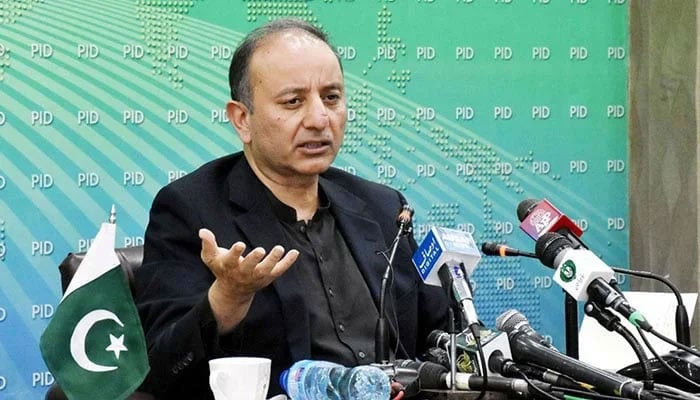India is disrupting Indus water flows, says minister
India’s Ministry of External Affairs did not immediately respond to email seeking information
Pakistan’s climate minister accused India of using dams to disrupt the flow of the Indus River system, as both countries seek international support amid a fragile ceasefire agreement, according to Bloomberg.
India is manipulating the flow of rivers that run into Pakistan by “holding and releasing, holding and then flooding”, Minister for Climate Change and Environmental Coordination Musadik Malik said on Monday in an interview in London, said the Bloomberg report titled ‘India Is Disrupting Indus Water Flows, Pakistan Minister Says’, published on Tuesday. While India lacks the storage capacity to completely stop the water, Malik noted that “when the water was needed for crop sowing, it was not available” over the past month.
“It is to disturb the crop patterns and the food security of Pakistan,” he said, adding that the government does not yet have estimates for crop damage.
India’s Ministry of External Affairs did not immediately respond to an email seeking information.
Both countries are sending delegations of diplomats and lawmakers to Europe, the US and other parts of the world in bids to shape international perception of a military conflict in May that brought the two nuclear-armed neighbors close to war. The standoff was triggered by an attack on mainly Indian tourists in the Indian-controlled part of Kashmir, Bloomberg reported.
New Delhi called it a terrorist attack and blamed Pakistan for its involvement -- allegations denied by Islamabad.
Indian Prime Minister Narendra Modi’s government paused the Indus Waters Treaty within 24 hours of the attack in the disputed region of Kashmir on April 22. The move came as a surprise, especially as the pact -- signed in 1960 to divide the use of six rivers between the countries -- had previously withstood multiple conflicts.
Pakistan’s population and economy are heavily dependent on Indus waters, with nine in 10 Pakistanis living in the river basin. More than 90 per cent of the country’s crops including wheat, rice and cotton use waters from the system -- with agriculture representing about a quarter of Pakistan’s gross domestic product.
In early May as tensions escalated between the neighbours, the Chenab river’s water flow was cut to nearly 90 per cent below the usual volume that passes to Pakistan, according to Muhammad Khalid Idrees Rana, spokesman for Pakistan’s Indus River System Authority. The Times of India reported that India has been flushing and desilting reservoirs at the Baglihar and Salal hydropower projects on the Chenab, which can disrupt normal flows, and plans other maintenance measures during the treaty suspension, the report added.
“Because they don’t have storage dams, they have not been able to materially affect us,” Malik said. “If they start to build the storage dams, it would be deemed as an act of war,” he said, reiterating the administration’s views.
-
 Can App Stores Really Keep Kids Off Social Media? Here’s What Experts Says
Can App Stores Really Keep Kids Off Social Media? Here’s What Experts Says -
 Margot Robbie Fears Being Dubbed A 'dumb Blonde' Due To Major Reasons: 'Hates The Idea'
Margot Robbie Fears Being Dubbed A 'dumb Blonde' Due To Major Reasons: 'Hates The Idea' -
 How Kate Middleton's Hyperemesis Gravidarum Left Her 'not The Happiest'
How Kate Middleton's Hyperemesis Gravidarum Left Her 'not The Happiest' -
 USA Beats Canada For First Olympic Hockey Gold In 46 Years; Donald Trump, Barack Obama & Others Hail Historic Victory
USA Beats Canada For First Olympic Hockey Gold In 46 Years; Donald Trump, Barack Obama & Others Hail Historic Victory -
 Claressa Shields Defeats Franchon Crews-Dezurn In Heavyweight Title Rematch
Claressa Shields Defeats Franchon Crews-Dezurn In Heavyweight Title Rematch -
 Sam Altman Calls Elon Musk’s Space Data Center Plan ‘ridiculous’
Sam Altman Calls Elon Musk’s Space Data Center Plan ‘ridiculous’ -
 Kara Braxton, WNBA All-Star And Champion, Dies At 43
Kara Braxton, WNBA All-Star And Champion, Dies At 43 -
 Anthropic Lead Engineer Predicts ‘software Engineer’ Role Can Disappear By 2026
Anthropic Lead Engineer Predicts ‘software Engineer’ Role Can Disappear By 2026 -
 Sharon Details Late Husband Ozzy's Final Days During His Sickness
Sharon Details Late Husband Ozzy's Final Days During His Sickness -
 Magic Vs Clippers: Clippers Announce Kawhi Leonard Status After Exit
Magic Vs Clippers: Clippers Announce Kawhi Leonard Status After Exit -
 BTC Price Today: Bitcoin Sinks Below $65K On Trade Uncertainty
BTC Price Today: Bitcoin Sinks Below $65K On Trade Uncertainty -
 'A Knight Of The Seven Kingdoms': All You Need To Know About The Finale
'A Knight Of The Seven Kingdoms': All You Need To Know About The Finale -
 NYC Travel Ban: Mamdani Shuts Down Roads Amid Blizzard Conditions
NYC Travel Ban: Mamdani Shuts Down Roads Amid Blizzard Conditions -
 Alicia Keys Celebrates 25 Years Of Breakout Single ‘Fallin’’
Alicia Keys Celebrates 25 Years Of Breakout Single ‘Fallin’’ -
 Akinola Davies Jr. Gives His Immigrant Parents A Shoutout In 2026 BAFTAs Acceptance Speech
Akinola Davies Jr. Gives His Immigrant Parents A Shoutout In 2026 BAFTAs Acceptance Speech -
 Princess Beatrice, Eugenie Told 'first Thing They Should Do' After Andrew Arrest
Princess Beatrice, Eugenie Told 'first Thing They Should Do' After Andrew Arrest




